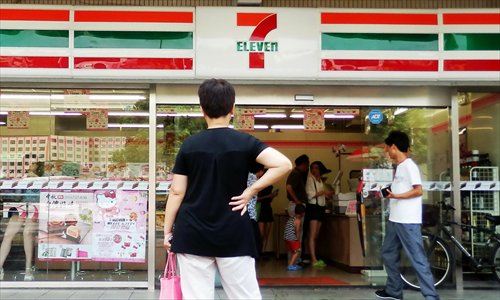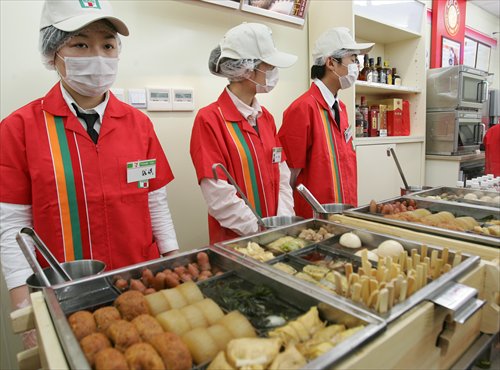HOME >> METRO SHANGHAI
Getting tough on sandwich sales
By Liao Fangzhou Source:Global Times Published: 2014-4-22 19:13:02

Shanghai's convenience stores sell 300,000 prepared cold food products daily. Photo: CFP
At Shanghai's 7,000-plus convenience stores, about 300,000 ready-to-eat cold food products - mainly bento (packaged rice or noodle meals), sushi, sandwiches and wraps - are offered for sale daily. But it was just on April 1 that authorities introduced food safety regulations to cover these products.
The Shanghai Food and Drug Administration set out the new regulations which are in two sections. "Local Standards for the Hygienic Manufacture and Sales of Prepared Cold Food Products" is the first regulation targeting all aspects of prepared cold food products from the choice of raw ingredients, processing, packaging, and transportation, to sales. It outlines the requirements, including the structural needs and facilities for food processing plants, the quality of the ingredients (including the freshness of oil when frying is involved), and hygiene.
The regulations stipulate that within two hours of manufacture, the temperatures of the products must be reduced to below 10 C and kept within that range when they are packaged and placed on shop shelves.
To ensure that these foods remain in ideal conditions between their places of manufacture and outlets, the regulations specifically state that manufacturers use "an appropriate number" of sealed vehicles equipped with refrigerating systems and thermometers.
The other regulation, "Local Standards for Prepared Cold Food Products," focuses on "technical requirements" including appearance, contamination controls and additives.
Expiration dates
City media has focused largely on the expiration date rules in the regulations which state that most refrigerated foods should not be sold after 24 hours but if the manufacturer can provide independent certification that the food is safe, some foods can be sold within 36 hours.
The timing begins at packaging when labels are attached showing the addresses of the manufacturer, ingredients, nutrition facts, and expiration time and date.
The Shanghai Dingfa Food Company in Songjiang district is a major manufacturer of prepared cold food products providing ready-to-eat meals for several convenience store chains, including FamilyMart. The company produces two batches of food daily, one packaged at 6 am and the other at 1 pm.
Their use-by dates, as shown on the labels, are 34 hours later. Most of them take 10 hours to be delivered to stores and they are then on the shelves for exactly 24 hours after that.
"These foods are sold in compliance of the new regulations because they are on the shelves here for 24 hours," explained one staff member at a FamilyMart outlet near the Shanghai Stadium, but this is not how the regulations read.
When the Global Times contacted Dingfa to ask whether it had independent certification, the company declined to respond. There was no indication of an independent certificate on the labels.
Jiang Lan, a senior at the Shanghai Normal University, is a regular consumer of the ready-to-eat meals from an All Days convenience store near the campus. She told the Global Times that it didn't matter whether the foods had been "approved" for longer than 24 hours or not, because she didn't buy anything made more than a day ago.
"What I really am concerned about is what the stores do with the leftovers. It would be really terrible if they simply re-packaged the products and attached new labels," Jiang said.
The Global Times talked to more than 10 convenience stores across the city. In spite of the fact that not all of them were aware of the new regulations, they all said they destroyed products that had passed their use-by dates.
The manager of a FamilyMart on Shimenyi Road explained that they first recorded the unsold expired product numbers with their computer, and then separated the plastic wraps from the food to dispose of them properly.

More city convenience stores are selling food prepared on the spot. Photo: CFP
Video surveillance
"All of this is done in the presence of two witnesses and under the store's video surveillance. Whenever the Shanghai Administration for Industry and Commerce officials come for an inspection, they always ask to see the footage of the disposal," the manager said. Similar procedures are reportedly practiced at Lawson, Quik, and C-store outlets.
Now stores could face more inspections. According to Gu Zhenhua, the deputy director of the Shanghai Food and Drug Administration, authorities will conduct more regular and widespread checks on convenience food outlets.
An increasing number of city convenience stores are not only selling prepared food but offering foods made on the spot including fried rice, Japanese oden and Chinese tea eggs.
On October 1, according to the Shanghai Food and Drug Administration, a new regulation governing these foods will be introduced, setting standards for the hygienic preparation of these types of food.
Posted in: Metro Shanghai